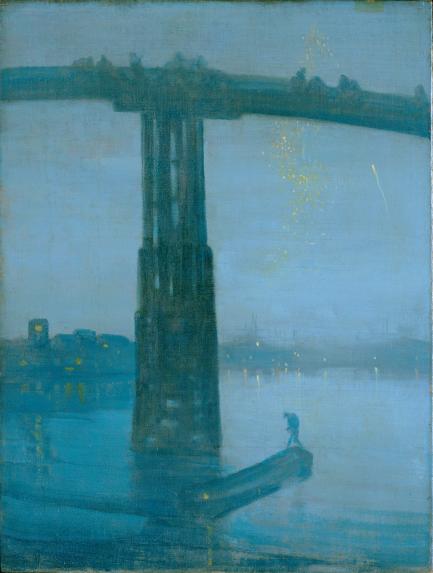
Nocturne: Blue and Gold—Old Battersea Bridge, by James McNeill Whistler; ca. 1872–1875; Oil on canvas; H x W: 68.3 x 51.2 cm; ©Tate, London 2013, presented by The Art Fund, 1905.
An American in London: Whistler and the Thames,” opening May 3 at the Smithsonian’s Arthur M. Sackler Gallery, is the first major exhibition devoted to American artist James McNeill Whistler’s early period in London, and it is the largest U.S. display of his work in almost 20 years. The exhibition showcases changing views of the capital city’s iconic riverbanks and waterways, revealing how Whistler emerged as one of the most innovative and original artists of the 19th century while London evolved into a modern city.
“Whistler was one of the most influential painters of his time, and now in a single show we’re able to look at the transformation of his work and the transformation of a city,” explained Julian Raby, The Dame Jillian Sackler Director of the Arthur M. Sackler Gallery and Freer Gallery of Art. “This is a huge opportunity for the U.S. public to celebrate one of their greatest artistic figures.”
On view through Aug. 17, the exhibition features more than 80 works from major museums in the U.S. and Britain, including 20 important oil paintings of Chelsea and the Thames, masterful prints and rarely seen drawings, watercolors and pastels. The exhibition culminates with an ensemble of the artist’s famous Nocturnes, including the iconic “Blue and Gold: Old Battersea Bridge.” Other highlights include the daytime industrial landscape “Brown and Silver: Old Battersea Bridge,” the schooners at rest captured in “Wapping” and selections from the Thames Set, an early series of etchings depicting the river’s seedy dockyards and dubious characters.
The Sackler’s presentation is the final venue of a three-city tour (previously at Dulwich Picture Gallery in London and the Addison Gallery of American Art in Massachusetts) and will be enhanced by the addition of nearly 50 masterpieces from the Freer Gallery of Art, which holds the world’s largest and finest collection of the artist’s work, including the famous Peacock Room. Museum founder Charles Lang Freer met Whistler in London in 1890 and became his most important patron. This is the first time since the Freer Gallery opened in 1923 that these works will be on view with Whistlers from other institutions.
Changing Art for a Changing City
“An American in London” focuses on the period during the 1860s and ’70s when Whistler (1834–1903) adapted the realist style he developed in Paris into a more personal aesthetic: “art for art’s sake.” He transformed scenes of gritty contemporary life, especially along the Thames riverbank, into moody and poetic views of the city, layered with color and atmosphere. It was during this time that he started to give his works musical titles such as “arrangement,” “symphony” and “nocturne” and drew inspiration from the composition and flattened forms of Japanese prints, some of which will be on view.
“Whistler developed radically new modes of expression as a response to the changing world outside his window in London’s Chelsea neighborhood,” said Lee Glazer, curator of American art at the Freer and Sackler galleries. “Through the visual poetry of his ‘arrangements’ and ‘nocturnes’ he reasserted the value of beauty, providing aesthetic compensation for the loss and alienation many Victorians associated with modern life.”
During this time, London was in a near-constant cycle of destruction and rebuilding. Historic landmarks—such as Battersea Bridge, a Whistler favorite—were altered or torn down to make way for mansions, factories and other modern structures. The river, however, maintained its central importance both as Whistler’s subject and as part of the lifeblood of the city itself.
“An American in London” also features portraits of Whistler and his associates, bringing to life the personalities surrounding the artist during this crucial time in his career, as well as historic photographs and maps that detail the London neighborhoods where he lived and worked.
The exhibition is joined by the related “Kiyochika: Master of the Night” (on view March 29–July 27), a series of woodblock prints from the same period featuring Tokyo’s rapidly changing urban landscape. Created by self-taught artist Kobiyashi Kiyochika (1847–1915), the prints combine traditional techniques and starkly dramatic compositions to show the Japanese capital city transformed by railroads, steamships, gaslights and brick buildings. Whistler and Kiyochika embraced artistic exchange between East and West and explored new ways to represent modernity and the city at night.
Organization
“An American in London” is organized by the Freer Gallery of Art and Arthur M. Sackler Gallery, Dulwich Picture Gallery and Addison Gallery of Art, and is co-curated by Margaret F. MacDonald, professor emerita, and Patricia de Montfort, lecturer, at the University of Glasgow in Scotland. Exhibition support is provided by the Mr. and Mrs. Raymond J. Horowitz Foundation for the Arts and the Friends of the Freer and Sackler Galleries. Additional support for programming is provided by the Terra Foundation for American Art.
Catalog
A beautifully illustrated catalog, “An American in London: Whistler and the Thames,” ($40, softcover, $60, hardcover; Philip Wilson Publishers, 2013, 191 pp.) contains detailed analysis of several of Whistler’s most important works and is available for purchase in the Sackler store.
The Arthur M. Sackler Gallery, located at 1050 Independence Avenue S.W., and the adjacent Freer Gallery of Art, located at 12th Street and Independence Avenue S.W., are on the National Mall in Washington, D.C. Hours are 10 a.m. to 5:30 p.m. every day (closed Dec. 25), and admission is free. The galleries are located near the Smithsonian Metrorail station on the Blue and Orange lines. For more information about the Freer and Sackler galleries and their exhibitions, programs and other public events, visit www.asia.si.edu. For general Smithsonian information, call (202) 633-1000.
# # #
SI-92-2014